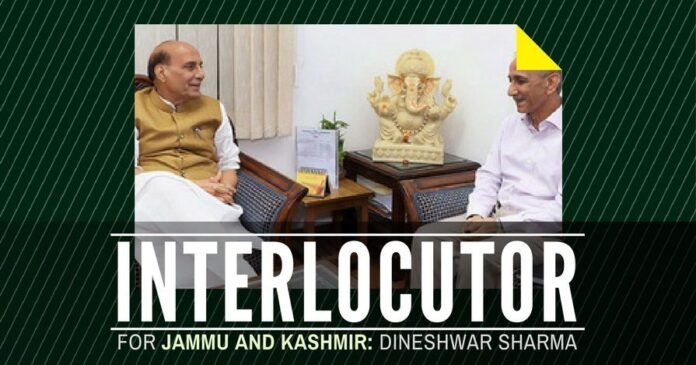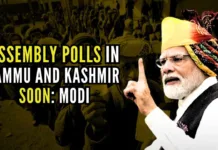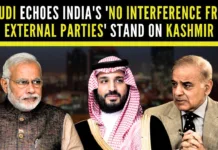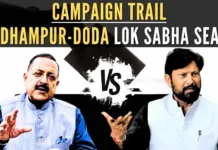
It is unclear as to what new thinking he will bring
The mainstream media seems to have again it wrong. This time with the aid and abetment of the Naïve Rajnath Singh who, at a hurriedly called Press Conference in Delhi on 23rd October announced the appointment of a “special representative” for a “sustained dialogue” with all stakeholders in Jammu and Kashmir, in a fresh move aimed at bringing peace to the troubled state — without simultaneously issuing a well articulated and reasoned press release.
That is why, one suspects, Dr. Jitendra Singh, a Minister of State in the Prime Minister’s Office had to later make a statement to the media (attached) to what the Home Minister had made in certain respects. This is an example of what happens when a top politician, who is not exactly known for his communication skills, makes an important oral announcement on a very important issue.
Be that as it may, the media tended to make startling headlines on what Rajnath Singh Singh had said. One screamed “Peace Gets Chance In Valley” in bold capital letters. Another mocked the Modi government by shouting “After hard talk, Centre offers J&K dialogue.” It was as if an interlocutor is all that is required to bring peace to J&K State, and as if the Modi government’s work on the issue of talks with the State’s residents in the last three years were creating the terrorism in the at State. The media was thus oblivious to the fact that ten Hurriyat leaders had been arrested very recently on the charge of securing illicit funds from Pakistan for creating mayhem in the State after using a large portion of those funds for enriching their own wealth.
It was as if the Union government was appointing an interlocutor for talks with J&K people for the first time ever.
As a matter of fact, the latest appointment of Dineshwar Sharma (the retired Intelligence Bureau Chief) as an interlocutor is the fourth occasion when this has been done by the Centre since 2002. The first one was former Union minister K C Pant, the second was of N. N. Vora, the present governor of the state, and the last was a three-member panel in October 2012. And zilch has come out of any one of them, with their reports reportedly gathering dust somewhere in the Home Ministry records.
One doesn’t know what the reports of the first three interlocutors were. But those of the third group were astounding and obviously not acceptable to the UPA government that appointed it.
Comprising the late Dileep Padgaonkar, a veteran journalist, as the head, it had two other members. One was Radha Kumar, whose work as an author has focused on ethnic conflicts and peace processes from a strongly feminist perspective; she was a post-graduate from Cambridge University and a Ph.D. from Jawaharlal Nehru University. The third member was M. M. Ansari, a former University Grants Commission member, a retired Chief Information Commissioner, who once confessed that he had never visited J&K and welcomed his appointment on the Interlocutors team.
The report of the Padgaonkar Team stated that “We visited the State every month for eleven months now, held consultations district by district in all of its twenty-two districts, met the leadership of large and small political parties, received over 700 delegations of community representatives comprising around 6,000 people, including around 1,000 Sarpanches and Panches, and conducted three round tables with civil society. Additionally, we have held around twenty meetings separately with youth, and three public meetings. Among the more influential community leaders, we met clerics, traders and workers’ associations, women’s groups, media and welfare organizations. Lastly, but in many ways most importantly, we met members of armed groups in prison, families of those killed in 2010, parents of the disappeared, and victims of militancy and human rights abuses. Our interactions with the heads of the police, para-military forces and the Army were most insightful.”
And what was the essence of their report? It recommended setting up a Constitutional Committee to review all Central Acts and Articles of the Constitution of India to the state extended after 1952.
The above recommendation was no different from what Farooq Abdullah’s State Government first, and then his son, chief minister Omar Abdullah had demanded. Both were rejected by the Central Government.
And what do you think the chief minister will now demand? Some sort of a “separatist” solution like her father always stood for, in private, if not in public. Maybe something like a plebiscite — like the one Pakistan has been thirsting for since The United Nations Security Council Resolution 47, adopted on April 21, 1948?
And what will the “younger generation” of J&K demand? It depends on whether they are asked in an atmosphere of full confidentiality. But it will also depend on whether they are truly representative of their universe in the State.
So what should one expect from Dineshwar Sharma after his “sustained dialogue” assignment? And what should expect till then?
Your guess is as good as mine. I just have one thought that plagues me: will Sharma and the Modi government also ask, we, the rest of India as to what it wants from J&K State? If not, why not? Aren’t we stakeholders in India that is Bharat?
Below is the clarification by Dr. Jitendra Singh:
“The dialogue process was always continuing (in J&K). But now attempts have been made to institutionalise the process by appointing a senior officer for a sustained dialogue with all stakeholders in all three regions – Jammu, Ladakh and Kashmir – and the rest of India,” the Minister of State (Mos) in the Prime Minister’s Office said.
Singh, who represents Udhampur constituency in the Lok Sabha, said some disgruntled politicians were trying to get their pound of flesh but the people of Kashmir, particularly the youths, were now keen to move ahead as part of the development journey led by Prime Minister Narendra Modi.
- To Editors’ Guild; May we also have our say… please? - July 17, 2019
- Farooq Sahab is either down with dementia or he is a congenital liar? - July 8, 2019
- Shah Bano, Muslims in gutter &Zakaria’s secularism - June 30, 2019











so, how did foreigners rohingyas – who reportedly have a bad history against hindus of myanmar – manage to come to be so easily accepted as the welcome residents in the eyes of the pdp folks, but we, the citizens of India, are not except as tourists with money to shower on kashmir’s economy?
this fact seems quite telling that kashmir needs some real tough love like it never had but always needed. yes, the real stakeholders are we, the citizens taxpayers of India, the real caretakers of the gimme gimme kashmiris with an attitude.
good one
The author’s question in the last para is correct. Knowing Mr Lavakare’s profound knowledge of issues in Kashmir I am not surprised by his thoughtful comments and the reservations he has. I do not think any politician- current or earlier- has ever thought of the questions raised by the author in the last para.
BJP has just lost the 2019 election !
Only BJp can snatch Defeat from the Jaws of Victory.